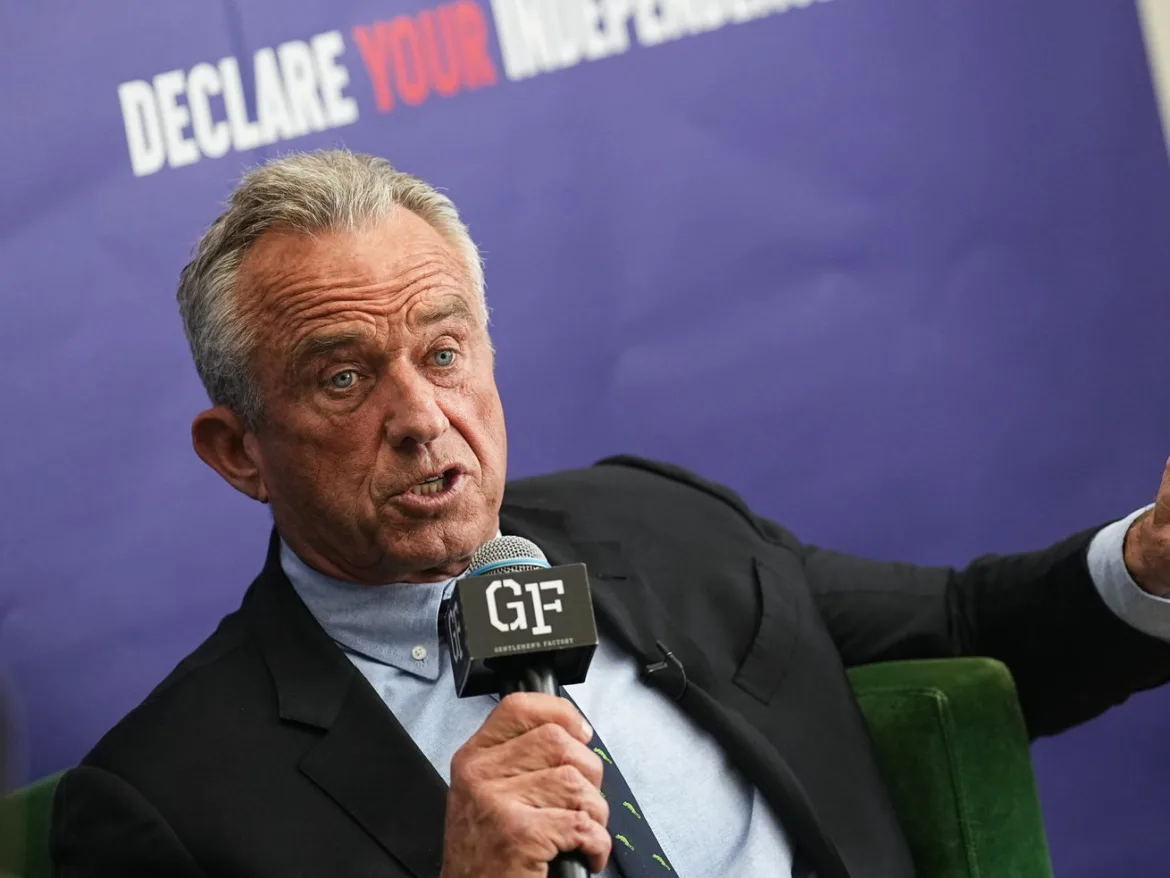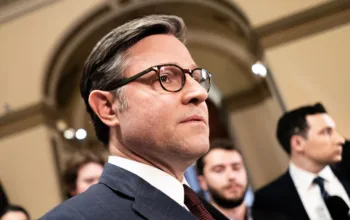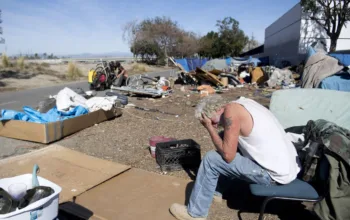The Kennedy conspiracy theorist and his potential to upend the 2024 presidential election, explained.
Robert F. Kennedy Jr. is expected to name Nicole Shanahan, a Silicon Valley lawyer and ex-wife of Google co-founder Sergey Brin, as his running mate in his 2024 independent presidential bid.
Shanahan does not have political experience, but she has previously donated to Democrats, including President Joe Biden’s 2020 campaign, and paid for the Kennedy campaign’s Super Bowl ad earlier this year. The announcement is expected at a campaign event in Oakland, California, on Tuesday.
Naming a running mate doesn’t make Kennedy, an environmental lawyer with several controversial views and a storied last name, any less of a longshot candidate. Just like every third-party candidate before him, he’s unlikely to come anywhere near winning the White House.
But he does have the potential to tip the election, though it’s not yet clear in which direction.
Kennedy is currently averaging about 12 percent in the polls, according to RealClearPolling. Celinda Lake, a pollster for President Joe Biden’s 2020 campaign who continues to work with the Democratic National Committee, said that’s a worrying signal for Biden, based on polling and focus groups her firm has been conducting that suggest Kennedy will pull voters from Biden. Clifford Young, who leads Ipsos’s global election and political polling risk practice, said it’s too early to be certain whether Biden or Trump stands to lose the most from Kennedy’s rise, but if he actually received such a large share of the vote, he has real potential to be a spoiler.
Kennedy’s ability to seriously cut into either Biden’s or Trump’s chances of winning, however, is limited by his ability to get on the ballot in all 50 states, which will require amassing a lot of signatures in an effort that would cost millions of dollars before fast-approaching deadlines. His campaign says he has qualified in four states so far, including two key battlegrounds: Nevada and Arizona.
The more states where he can get on the ballot, the more potential for chaos his presence in the race creates. Democrats are beginning to take that threat more seriously.
“This election is going to be extremely close just like the last election, so every vote that does not go to Joe Biden is going to hurt Joe Biden, whether it goes to Donald Trump or to RFK. It’s all the same, and with the race this close, we can’t afford to lose any votes,” said Chuck Rocha, a senior adviser on Sen. Bernie Sanders’s (I-VT) 2020 presidential campaign.
Who is RFK Jr.?
It’s still very early in the election cycle, and many voters may not know much about Kennedy beyond his name — and they may not have heard what he believes. Some analysts think his support in the current polling represents more symbolic discontent from voters who dislike both Biden and Trump than a real commitment to supporting him as an individual candidate.
“People are not paying attention,” Young said. “He’s filling a vacuum. And that vacuum is this disaffected voter vacuum. I think he’s a placeholder more than anything else.” Kennedy, who announced his candidacy in April, is the nephew of former President John F. Kennedy and son of former Attorney General Robert F. Kennedy. For much of his life, he has been a scion for one of the most storied families in Democratic Party politics and backed Democrats.
But his relationship with the Democratic political establishment has frayed.
Disavowed by members of his own family, the previously celebrated environmental justice lawyer who helped clean up New York’s Hudson River now peddles false conspiracy theories about the Covid-19 vaccine. While his primary bid against Biden failed to gain traction, his independent run has received the praise of prominent right-wing figures and Silicon Valley billionaires.
His campaign is predicated on ending what he calls the “corrupt merger of state and corporate power that is threatening now to impose a new kind of corporate feudalism in our country,” he said in his announcement speech.
He can sound more like a MAGA Republican than a Democrat. Kennedy himself has acknowledged that he holds controversial views.
“I am not an ideal presidential candidate,” he said in his 2023 campaign announcement. “I’m not one of these people who said I have to be careful because one day I’m going to be in the White House.”
Biden wouldn’t debate Kennedy or any other of his Democratic challengers, as is typical in a primary where an incumbent is running for reelection. But if he did, a debate would have revealed stark differences between them.
Kennedy has become one of the leading voices of the anti-vaccine movement. He has pushed disinformation about vaccines since 2005, when he falsely claimed that some childhood vaccines had dangerous levels of mercury that could cause autism, despite the fact scientists had already proven that mercury levels in those vaccines were not harmful and did not lead to autism. Some of his family members spoke out against his anti-vaccine rhetoric: “He has helped to spread dangerous misinformation over social media and is complicit in sowing distrust of the science behind vaccines,” two of his siblings and his niece wrote in a 2019 Politico op-ed.
But Kennedy’s profile nevertheless took off during the pandemic. He likened vaccine passports to the Holocaust in remarks at a January 2022 rally in Washington that he later apologized for, and that were even condemned by his wife, Curb Your Enthusiasm actress Cheryl Hines.
In a bestselling 2021 book, he accused Anthony Fauci, former chief medical adviser to Biden and a member of Trump’s White House coronavirus task force, of using the pandemic to organize a “coup against Western democracy.”
He also founded the nonprofit Children’s Health Defense, which has become one of America’s most influential anti-vaccine advocacy groups. Facebook and Instagram took down the group’s accounts but have since reinstated Kennedy’s personal account now that he’s running for president.
Kennedy’s views might resonate with the quarter of Americans who were still skeptical of Covid-19 vaccines as of March 2023. But it’s out of step with the majority who have been vaccinated or plan to get vaccinated. Kennedy seems to recognize that gap and has largely refrained from discussing his views on vaccines on the campaign trail except in veiled references.
Kennedy’s embrace of conspiracy theories, however, isn’t limited to vaccines.
He claims that his father wasn’t killed by Sirhan Sirhan and has pushed for Sirhan’s release from prison, opposed by all but one of his seven siblings. He’s argued that 5G cellphone transmission towers are being used to “harvest our data and control our behavior.” He claimed that Republicans stole the 2004 presidential election. He blames psychopharmaceuticals for mass shootings; he says the CIA had a role in former President Kennedy’s assassination and that the agency could one day come after him.
But despite Kennedy’s polarizing record, Democratic strategists are worried that some voters might be more inclined to support him simply because he’s a Kennedy.
“Sure, he’s a crazy anti-vaxxer, conspiracy theorist, [rumored] steroid enthusiast, and tough communicator, but at the end of the day, his last name is still Kennedy, and I believe that will allow him to gain way more Democratic votes than Republican, so I think he hurts Joe Biden more than Donald Trump,” Rocha said.
Why Kennedy could be a spoiler candidate
Third-party candidates tend to poll much better than they actually perform on Election Day, when their supporters are confronted with the reality that their preferred candidate won’t win.
What’s unusual this year is the sheer number of disaffected voters who don’t like either Biden or Trump and just want someone — anyone — as an alternative. Young said that, when Ipsos polls a theoretical no-name candidate as an alternative to Biden and Trump, that person gets about 10 percent. (That share is not far from Kennedy’s current level of support.)
“We haven’t had a situation where we have had so many viable third-party candidates, and so many people who don’t like either [major party] candidate,” Lake said.
In addition to Kennedy, the group “No Labels” headed by former Senator and Democratic vice presidential nominee Joe Lieberman as well as the Green Party and the Libertarian Party have promised to name presidential tickets of their own. Cornel West, the progressive political commentator, is also running as an independent.
Kennedy’s supporters span the race, age, and income spectrums, according to Ipsos’s polling. They are slightly more likely to be women and to identify as independents, leaning a bit more right than left and embracing more conservative economic policies but centrist stances on social issues, Young said.
Lake said that in her polling and focus groups, about half of Kennedy’s supporters back him because they associate him with his father. Other Democrats or Democratic-leaning independents, particularly young voters, embrace his credentials as an activist environmental lawyer.
Young said it’s difficult to tell at this point whether that suggests that Biden or Trump is more likely to benefit from his presence in the race.
“It’s going to confuse things. Things are going to get cloudy. I don’t think it’s so easy to say that he’s gonna hurt one or the other,” he said, citing Ipsos polling showing how his supporters aren’t strong partisans and how their views on particular issues are scattered.
But Lake said that “it would take a real jiujitsu of people’s thinking” for Kennedy to hurt Trump.
Accordingly, Democrats have sought to hamper Kennedy’s independent bid. The party recently established a team of lawyers dedicated to ensuring that he won’t make it on more state ballots if he violates complicated ballot access rules.
But Democrats may also have to work to better define him as a candidate. Democratic primary voters’ initially net-positive impression of him became net-negative once they learned more about his positions through the primary process, and that could serve as a model, Lake said.
“There would need to be a serious effort to define or reveal who he is,” she added.



